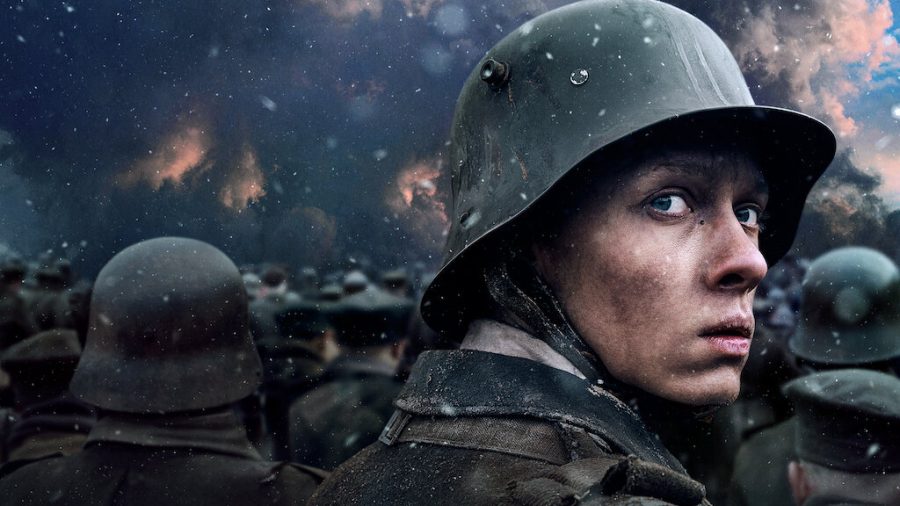The Death of the Old Lie : A Review of All Quiet on the Western Front
French director and film critic Francois Truffaut claimed “there’s no such thing as an anti-war film.” This is because of these movies’ fascinating displays: the thrill of combat, the onscreen camaraderie, and depiction of brotherhood. Even war movies with plenty of tragedy and suffering still manage to make death and violence seem heroic, and they seldom portray their own country’s military actions in an accurate manner. Though characters can give speeches about the horror and futility of combat, and films may tug at audiences’ heartstrings by killing off beloved characters, such material can never truly be drained of its basic fascination. Therefore, most attempts to use the medium as a form of protest become weaponized against themselves.
I held similar sentiments to Truffaut’s claim about the failure of “anti-war” films to be truly anti-war, until I watched All Quiet on the Western Front. This film was introduced to me by my history teacher, who played it for our class on the Friday before winter break. The brief half-hour that we watched before the bell rang left us all wide-eyed and speechless. I spent my first day of break finishing the film, and the next few days thinking about it. All Quiet on the Western Front truly destroys “the old lie”: that “it is sweet and fitting to die for your country.”
Adapted almost a century after the 1928 publication of Erich Maria Remarque’s harrowing war novel, Edward Berger’s German-language adaptation retells the story of a disillusioned soldier Paul Bäumer (Felix Kammerer). All Quiet on the Western Front (2022) has been nominated for nine Oscar Awards, and is leading the race in the BAFTA awards.
The early scenes of the film depict young German enlistees with grins plastered on their faces as they cheer “for the Kaiser, God, and the fatherland!” Paul Bäumer is blissfully ignorant when he receives his uniform, even though it is much too large for him, and had just been recycled off of a corpse. Nevertheless, he is eager to fight for his country and to prove himself a man. But, this initial excitement is soon shattered by the horror of life in the trenches. It is not long before the soldiers’ proud smiles become replaced with frightened expressions that appear to be begging for their mothers, for God’s mercy, and for something, anything, to save them from the utter hell that they find themselves in. The faces of these men are haunting portraits covered in filth, with pink cheeks only occasionally visible beneath the grime and white eyes so bright they seem to be targets. And relentlessly, targets are exactly what they are.
Human life is meaningless in this film. It does not waste more than a few seconds on death, and it does not need to; death is the whole plot. Death is inevitable and it does not discriminate. Paul collects the identity tags from the corpses of his fellow soldiers, so their names can become a number, engraved in a memorial once a few men can miraculously come to an agreement. The insatiability of death in this film strips war bare of any notion of heroism that is attached to it.
One particularly gut-wrenching scene reduced me to tears. Paul stabs a French soldier to death, and then almost immediately after, he cries, trying desperately to save the soldier’s life as he suffers through his last seconds in agony. Covered in blood and mud, Paul apologizes to the soldier and weeps. When he realizes that he cannot save him, Paul searches for something to identify the soldier. In his pocket, Paul finds a photograph of his wife and daughter, which paralyzes him with the consciousness of what he had done. He continues to weep as he rests his head against the soldier’s chest, and makes a promise that can never be fulfilled.
Paul had killed “the enemy.” But why was this man his enemy? Was he not a person, just the same as him, who was following orders to kill and kill and kill? This did not matter, they did not matter. The soldiers seemed to have lost any sense of identity, for there is no “I” in war. Individuality and war cannot coexist. The essential purpose of each soldier was to form one large killing machine, which was subject to follow orders from those who only led them further down the uncertain– but certain– path to death.
This disconnect between soldier and general is most emphasized in a scene that occurs at the end of the film. The armistice stated that the Western front was to fall silent on November 11th, 1918, at 11 o’clock, but the zealous General Erich Ludendorff insisted that the German army would not relinquish their pride. Just before the ceasefire, the general looks at the faces of the exhausted and traumatized soldiers and gives a speech. He commemorates them for their courage, and says that their reward will be the “admiration” for all they had “achieved” here. As the general rambles on about German glory and the “perfidious” armistice, panic and protest erupts amongst the soldiers when they realize that they are being sent out for one last attack against the French. The French soldiers are shown celebrating the armistice just before the Germans attack their trenches. Thousands die on both sides. The exploitation of the common soldier is a theme the film never tires of showing.
Paul manages to avoid death up until the very last second. He is killed by a French soldier at precisely 11 o’clock, just as the ceasefire is called. He stares up into the sky from the trenches, and all is quiet.
All Quiet on the Western Front is excruciating. The audience joins Paul as he faces every conceivable fear, which leaves a profound impact on the viewer. But to call this film impactful is an understatement. All Quiet on the Western Front is an astounding, but utterly bleak, masterpiece. It is excessive, but it needs to be. This film is a sobering reminder of the “old lie.”

Shireen is a junior in the IB program here at Harriton. She is very grateful that she has earned an editorial position for the Banner this year, and she...


